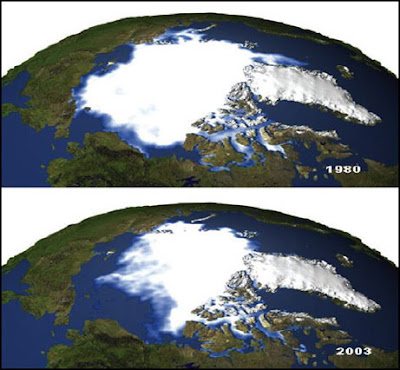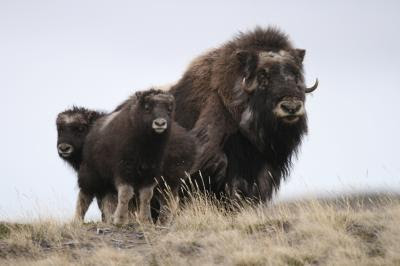 Según Eric Post, Profesor Asociado de Biología en la Penn State University de Pensilvania (EEUU), "El Artico, tal como lo conocemos, podría pronto ser cosa del pasado". Post dirige un extenso equipo internacional que ha llevado a cabo estudios
Según Eric Post, Profesor Asociado de Biología en la Penn State University de Pensilvania (EEUU), "El Artico, tal como lo conocemos, podría pronto ser cosa del pasado". Post dirige un extenso equipo internacional que ha llevado a cabo estudiosde la respuesta biológica, a nivel de ecosistema, al calentamiento del Artico, durante el 4º Año Polar Internacional, que finalizó en 2008.
Los científicos han encontrado que el aumento medio anual de la temperatura superficial del Artico en los útlimos 150 años, ha originado efectos dramáticos. Así, en los últimos 20 a 30 años, el mínimo estacional de cubierta de hielo ha disminuido 45.000 kilometros cuadrados por año. De manera similar, la cubierta de nieve ha disminuido constantemente, con unos procesos de deshielo y fragmentación cada vez más tempranos y una estación de cultivos cada vez más larga.
"Muchas especies terrestres y marinas están dufriendo las consecuencias adversas del comportamiento humano a latitudes de miles de kilómetros de distancia". Según Post "No importa donde se mire, en el suelo, en el aire o en el agua, veremos señales de cambios rápidos"
El estudio demuestra que muchas especies icono del Ártico que dependen de la estabilidad y permanencia del hielo oceánico están sufriendo consecuencias “devastadoras”. La pérdida de hábitat de hielo polar está causando una caída vertiginosa del número de ejemplares de gaviotas marfil, morsas del Pacífico, focas oceladas, focas de casco, narvales y osos polares
El estudio se publica en el número de Science del 11 de septiembre de 2009
 "The Arctic as we know it may soon be a thing of the past," says Eric Post, Associate Professor of biology at Penn State University. Post leads a large, international team that carried out ecosystem-wide studies of the biological response to Arctic warming during the fourth International Polar Year, which ended in 2008.
"The Arctic as we know it may soon be a thing of the past," says Eric Post, Associate Professor of biology at Penn State University. Post leads a large, international team that carried out ecosystem-wide studies of the biological response to Arctic warming during the fourth International Polar Year, which ended in 2008.The scientists found that the increase in mean annual surface temperature in the Arctic over the last 150 years has had dramatic effects. In the last 20 to 30 years, for example, the seasonal minimal sea ice coverage has declined by a staggering 45,000 square kilometers per year. Similarly, the extent of terrestrial snow cover has declined steadily, with earlier melting and breaking up and an earlier start to the growing season.
"Species on land and at sea are suffering adverse consequences of human behavior at latitudes thousands of miles away," declares Post. "It seems no matter where you look -- on the ground, in the air, or in the water -- we're seeing signs of rapid change."
The study shows that many iconic Arctic species that are dependent upon the stability and persistence of sea ice are faring especially badly. Loss of polar ice habitat is causing a rapid decline in the numbers of ivory gull, Pacific walrus, ringed seal, hooded seal, narwhal, and polar bear.
The study is published in the September, 11 issue of the Science magazine
Tomado de/Taken from Plataforma SINC/Science Daily
Resumen de la publicación/Abstract of the paper
Ecological Dynamics Across the Arctic Associated with Recent Climate Change
Eric Post,Mads C. Forchhammer, M. Syndonia Bret-Harte,Terry V. Callaghan,Torben R. Christensen, Bo Elberling, Anthony D. Fox,Olivier Gilg,David S. Hik, Toke T. Høye, Rolf A. Ims, Erik Jeppesen, David R. Klein, Jesper Madsen, A. David McGuire, Søren Rysgaard, Daniel E. Schindler, Ian Stirling, Mikkel P. Tamstorf, Nicholas J.C. Tyler, Rene van der Wal, Jeffrey Welker, Philip A. Wookey, Niels Martin Schmidt, Peter Aastrup
Science 11 September 2009:
Vol. 325. no. 5946, pp. 1355 - 1358
DOI: 10.1126/science.1173113
Abstract
At the close of the Fourth International Polar Year, we take stock of the ecological consequences of recent climate change in the Arctic, focusing on effects at population, community, and ecosystem scales. Despite the buffering effect of landscape heterogeneity, Arctic ecosystems and the trophic relationships that structure them have been severely perturbed. These rapid changes may be a bellwether of changes to come at lower latitudes and have the potential to affect ecosystem services related to natural resources, food production, climate regulation, and cultural integrity. We highlight areas of ecological research that deserve priority as the Arctic continues to warm.
No hay comentarios:
Publicar un comentario